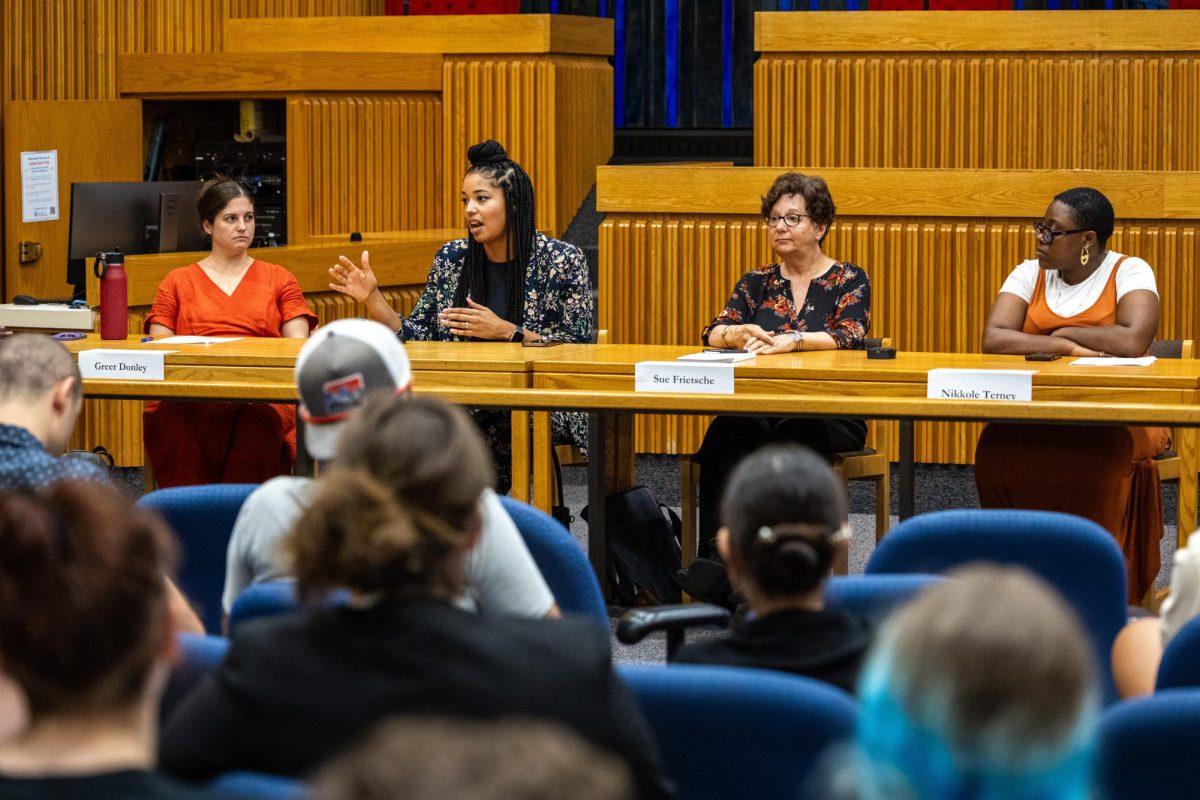Following the Dobbs v. Jackson Women’s Health Organization Supreme Court decision, which ruled that the Constitution does not confer the right to abortion, many states have experienced a significant rollback on abortion access. For Sue Frietsche, interim co-executive director of the Women’s Law Project and adjunct professor at Pitt’s School of Law, Pennsylvania is not a “sanctuary state” for abortion access.
“We are one of the states where only doctors are allowed to provide abortion care, and that restriction extends even to mifepristone, the dispensing of a pill,” Frietsche said. “That limits the pool of available practitioners to only Pennsylvania licensed physicians.”
Pitt Law If/When/How, PLWA, Outlaw and Pitt Gender, Sexuality, and Women’s Studies Program held a panel discussion on abortion access in Pennsylvania on Wednesday afternoon. Panelists included Frietsche, Sydney Etheredge, Nikki Terney and Greer Donley. The panel discussed restrictions in accessibility, misunderstandings about legality and the prices surrounding abortion.
Frietsche acknowledged that minors are required to obtain parental consent to obtain an abortion in Pennsylvania and said the process of obtaining an abortion without parental consent had additional restrictions imposed that were more “terrifying” than the abortion itself.
“If you don’t dare to ask your parents for that permission, then you must do something that is terribly hard, which is go before a judge and tell the judge why you are mature enough to make this decision yourself,” Frietsche said. “The Women’s Law Project represents minors in these hearings that are called judicial bypass hearings.”
Etheredge, executive director of Planned Parenthood of Western Pennsylvania, said many pregnant people are forced to travel to different states to obtain an abortion following the Supreme Court ruling.
“Immediately, we started seeing calls from patients from Ohio trying to get care and the patients from Pennsylvania were just confused,” Etheredge said. “Prior to Dobbs, about 16% of our patients were from out of state. Now, about a quarter of our patients are from out of state, and they’re coming as far west as Texas.”
Donley, associate professor of law, said there continues to be ambiguity about whether states can prosecute people for traveling to another state to obtain an abortion and health care providers who are offering care in those legal states.
“You might have seen a Washington Post story that came out just this week talking about how a bunch of small cities in Texas are passing laws making it illegal to use their roads to travel to get abortion care in another state,” Donley said. “There’s, you know, movement in these rural towns that have important highways that are necessary to leave a state.”
Donley said those who believed it was illegal and difficult to leave their state to access an abortion were turning to domestic and international online buyers to receive pills. She said recent regulations have been used as a fear tactic.
“I think this is mainly about creating fear,” Donley said. “If people think that it’s illegal to use the highway to leave the state to get an abortion, they might not get one because they’re afraid, right?”
Terney, director of abortion care at Allegheny Reproductive Health Center, has had to navigate the costs of inflation. She said most abortions are covered through self-pay and cash, so it is important to not create unreasonable prices. She said the clinic receives a portion of its funding through donations. However, these come with limitations on how they are used.
“Our clinic is a little nervous,” Terney said. “I’ll be honest, when working with other clients sometimes just because we have one or two instances where people have donated so much money and want to provide a certain type of abortion when they say you can have this money, but it can only be used for people that are under 14 weeks.”
Although clinics have worked to provide abortion funding for their patients, Donley said individuals residing in red states are finding other methods to obtain abortions at home. She said most people seeking abortions were already parents and could not afford to travel.
“These new networks have been forming,” Donley said. “They started before Dobbs, but there’s an explosion of them. It’s not even doctors anymore. It is literally people going to Mexico, buying misoprostol and, through Reddit, connecting with other people and giving them pills and people having safe and effective abortions at home.”
Etheredge said there were numerous ways in which students could assist local clinics, like volunteering as clinic escorts or electing agreeable representatives. She added that it’s especially important that students vote.
“Make sure you all register to vote here,” Etheredge said. “Voting is so important now more than ever, and I have to plug that as we’re heading into the election.”


